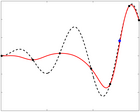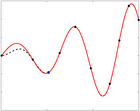Numerous fields in civil engineering need investigations on the influence of the model parameters on the system responses. Important analyses are reliability analysis, sensitivity analysis, and nonlinear optimization, which all require several calls of the observed engineering model and therefore high computational effort. A commonly applied technique to overcome this issue is to use data-based models, so-called surrogate models. Through that, not the full amount of the data needs to be simulated with the original engineering model because the applied surrogate approximates parts of the data and the computation time can be effectively reduced.
The aim is to evaluate the resulting model quality and to guarantee a sufficient and robust approximation quality. If the resulting approximation quality of the applied surrogate model is not sufficient, the approximation has to be improved. Techniques for improving the model quality could include model combination or adaptive sampling method.




Figure 1: Approximation of f(x)=x sin(x) with adaptive sampling
Project-related publications (selection)
- M. Steiner, J.-M. Bourinet, & T. Lahmer, 2019. An adaptive sampling method for global sensitivity analysis based on least-squares support vector regression, Reliability Engineering and System Safety, Volume 183, Pages 323 - 340.
- M. F. Badawy, M. A. Msekh, K. M. Hamdia, M. Steiner, & T. Rabczuk, 2017. Hybrid nonlinear surrogate models for fracture behavior of polymeric nanocomposites using phase field model, Journal of Probabilistic Engineering Mechanics (PREM), Volume 59, Pages 64 - 75.
- Steiner, M., Khosravian, R., & Lahmer, T., 2015. Quality of estimated sensitivity indices based on metamodels, Proceedings of the 13th international Probabilistic Workshop (IPW 2015), Liverpool, UK.
Contact
M. Tauscher, M.Sc.
Bauhaus-Universität Weimar
Chair of Computing in Civil Engineering
Coudraystraße 13 b, Room 002
99423 Weimar
Email: maria.tauscher[at]uni-weimar.de
Phone: +49 3643 58 4219
